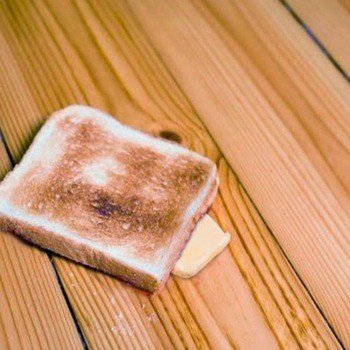Buttered-Side Down - The Physics
Chances are you've come across the old wives' tale that 'buttered toast always lands face down'.
This gloomy adage likely represents a metaphor for Murphy's Law (or Sod's Law to us here in the UK), which isn't actually a scientific law at all but rather the glass-half-empty philosophy that 'anything that can go wrong will go wrong'.

Talk of a real 'buttered-side down' phenomenon can be traced back to the 19th century and a light-hearted poem by English novelist James Payn in 1884:
I never had a slice of bread,
Particularly large and wide,
That did not fall upon the floor,
And always on the buttered side!
Phenomenon Or Pessimism?
The Discovery Channel's Mythbusters and the BBC's Q.E.D. have independently concluded that buttered toast thrown into the air lands buttered-side down only around half of the time. However, scientific studies such as the one conducted by Robert Matthews in 1996 have suggested that bread falling from table height does, more often than not, abide by Murphy's Law.
So what's going on?
Falling vs. Launching
The important difference between the two sets of studies is the way in which the toast is projected towards the floor. By launching a slice of toast upwards (or significantly horizontally) we introduce enough variables to make the outcome near-enough random.
Depending on the point-of-contact with the toast upon release, the distribution of butter along the surface and the force with which the toast is thrown, calculable variables can include the effects of the toast's angular momentum, period of rotation and moment of inertia, all properties pertaining to rotational kinematics.
However, if we limit the situation to toast falling, almost completely vertically and without an external non-gravitational force, we drastically reduce the number of unknowns. This was the approach taken by Matthews' and similar studies, and their results were conclusive.
Rotation
So is there a clever method to increase the likelihood that your dropped toast is salvageable?
In practice, no.
The amount and type of butter added has no effect on rotation provided that it is spread evenly and allowed to soak into the slice; the butter's mass is negligible and has little effect on the location of the centre of mass within the slice, providing an insignificant change in the toast's overall moment of inertia.
So what does affect the chances of casualty for dropped (but not launched) toast?
The key here is to recognise that falling toast will almost always have slipped from a hand or plate at an angle, with a point of contact outside the line of its centre of mass. As a result, the toast will rotate as it falls.
For a table of height between two and six feet, the average Earthward slice of toast has time to complete only one-half rotation and will land face-down.
Protecting Your Wheat-Based Assets
A toast-lover looking to mitigate the risk of carpet-fluff has two options:
build a ten-feet-tall table to allow time for a full revolution or plate toast upside-down.
And should your friends laugh at your impractically tall coffee table or your messy upside-down toast, be safe in the knowledge that you'll be the one laughing when breakfast takes a tumble.

If you enjoyed this article and want more, follow the everyday science blog for your daily dose of science.
References:
University Physics with Modern Physics by Young and Freedman
www.wikipedia.org
Discovery Channel's Mythbusters
E4's Scrubs
Off to buy my table...
Cheaper to just stack two.
As a buttered toast always lands face down, and a cat always lands on its feet, what would happen if you fix the buttered toast on the back of the cat?
Depends how tall your table is!
Maybe is the cat rather flying, isn't it?
thanks for interesting minds :)
Glad you enjoyed!
Great article, I gained a lot of knowledge from you, here's a tip for you
Thank you, pleased you liked it.
Resteemed.
Thanks!